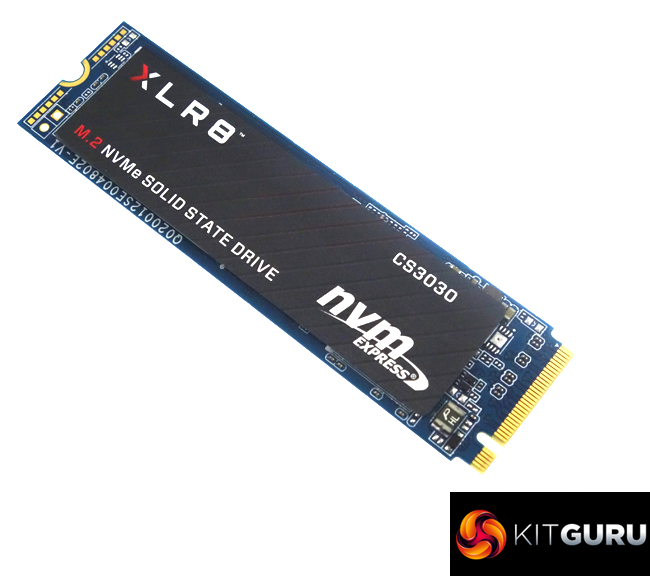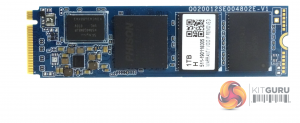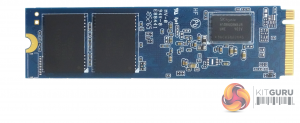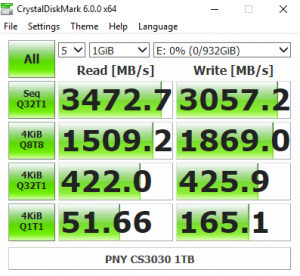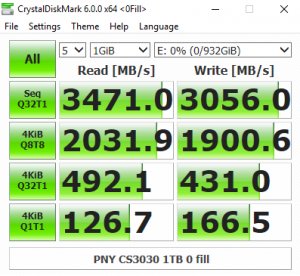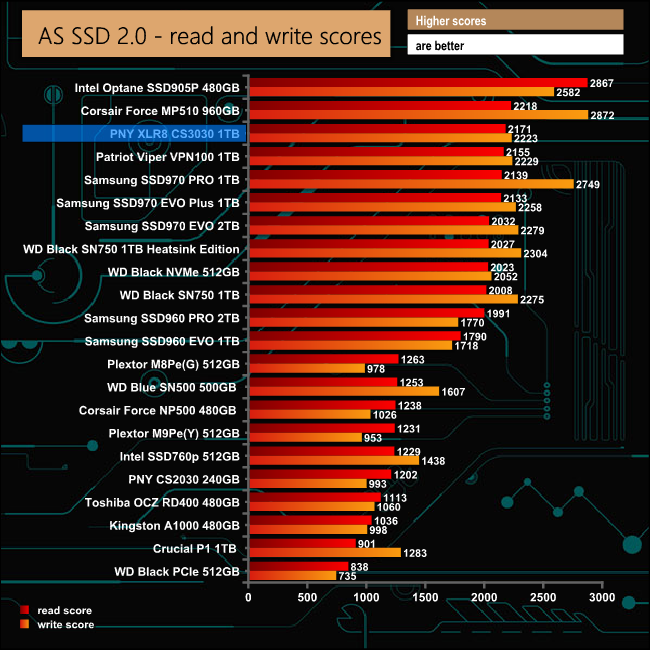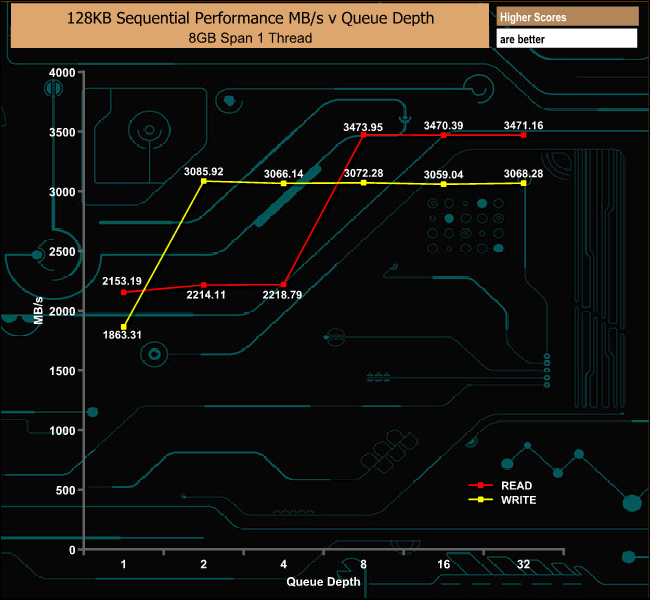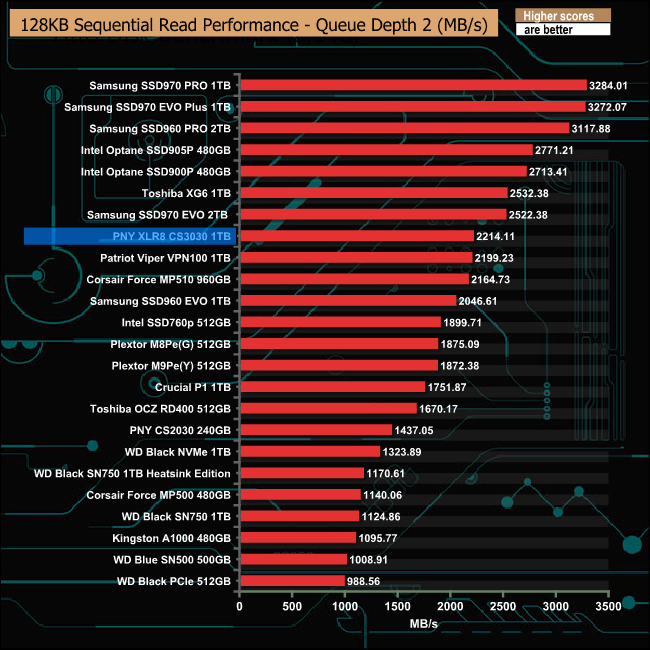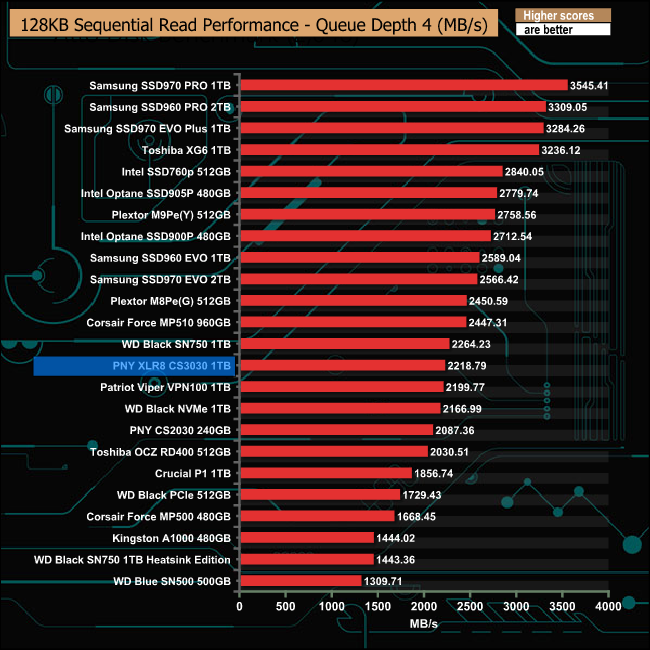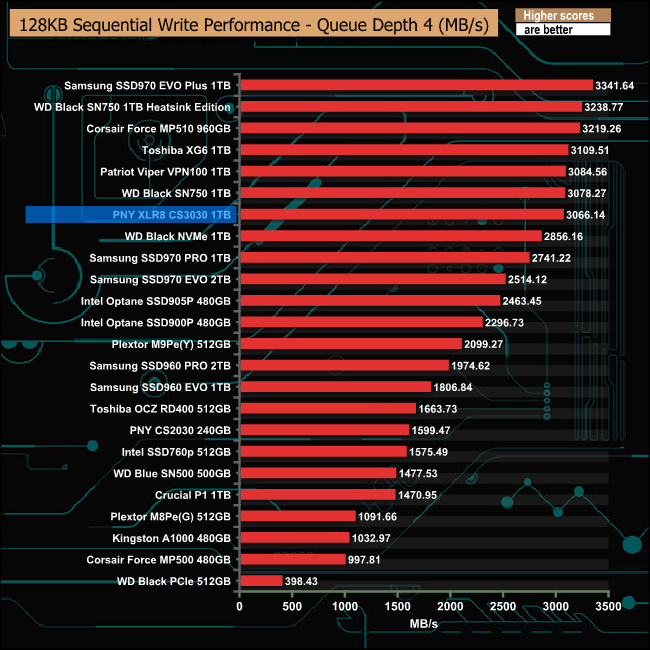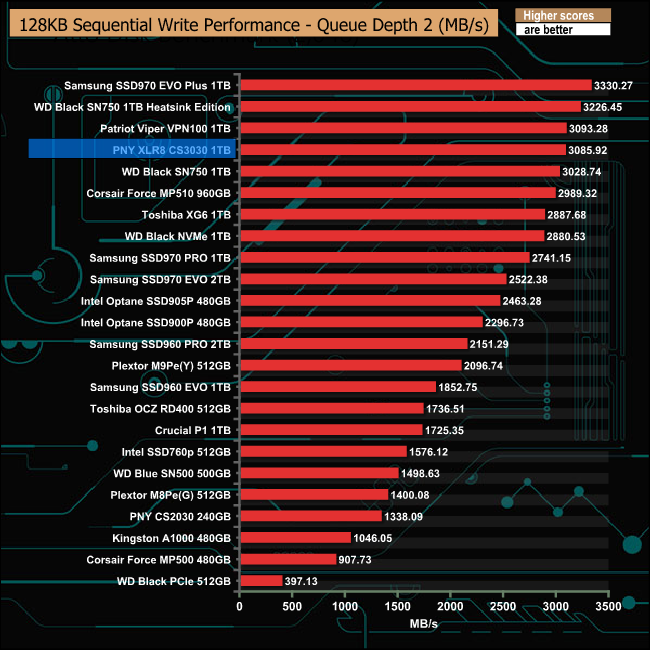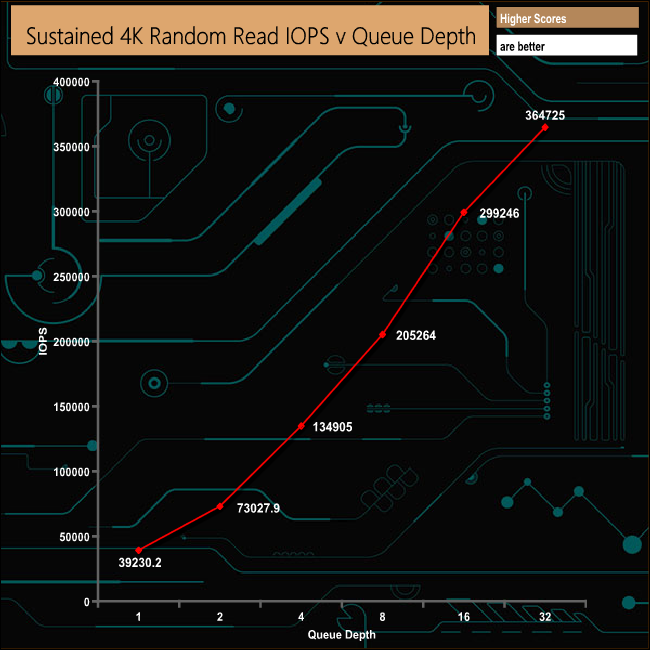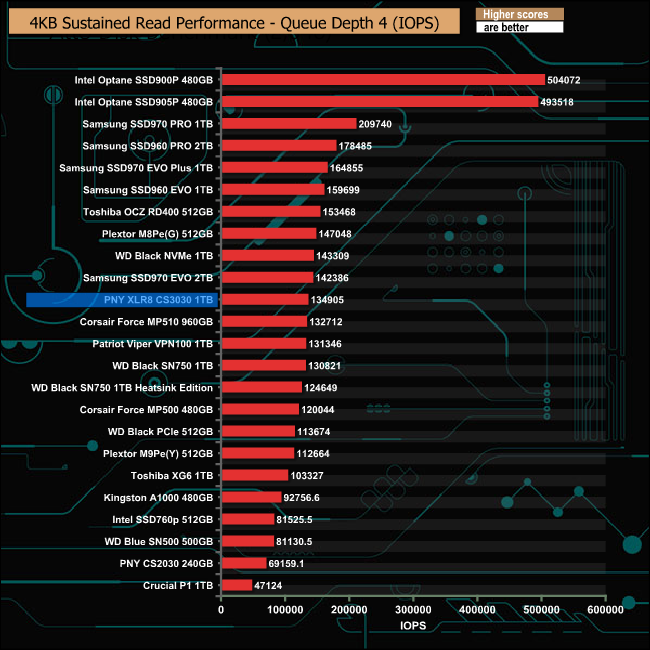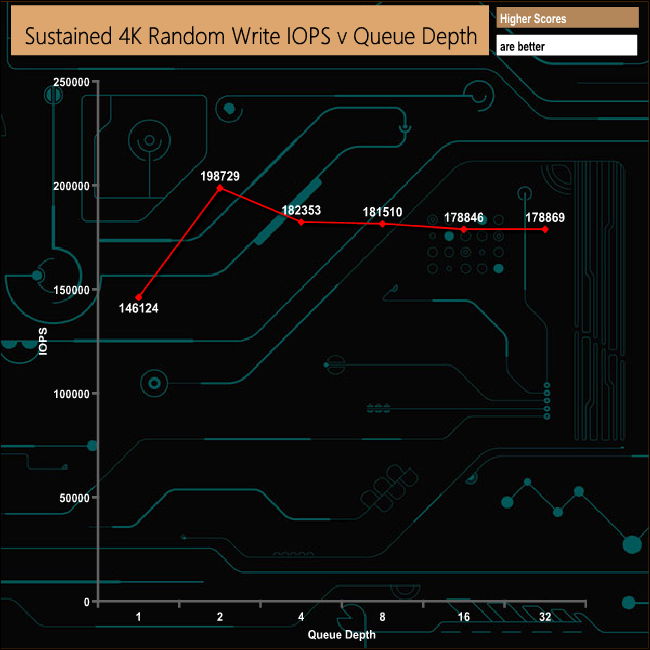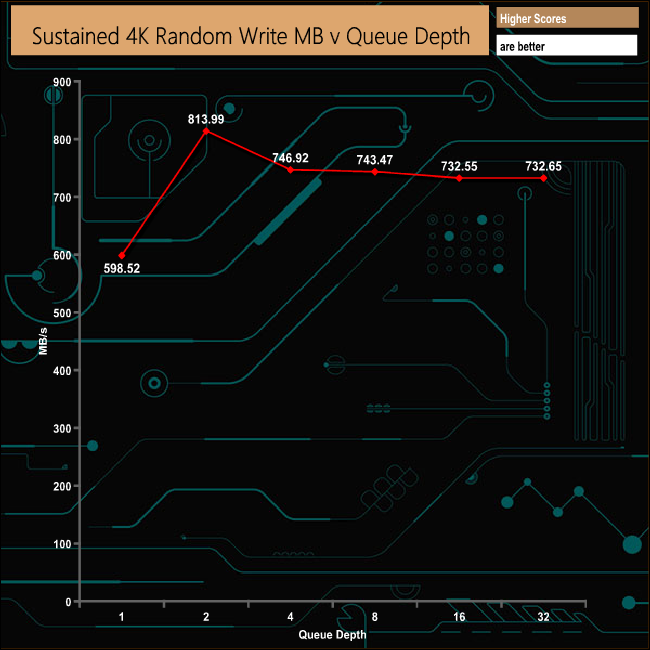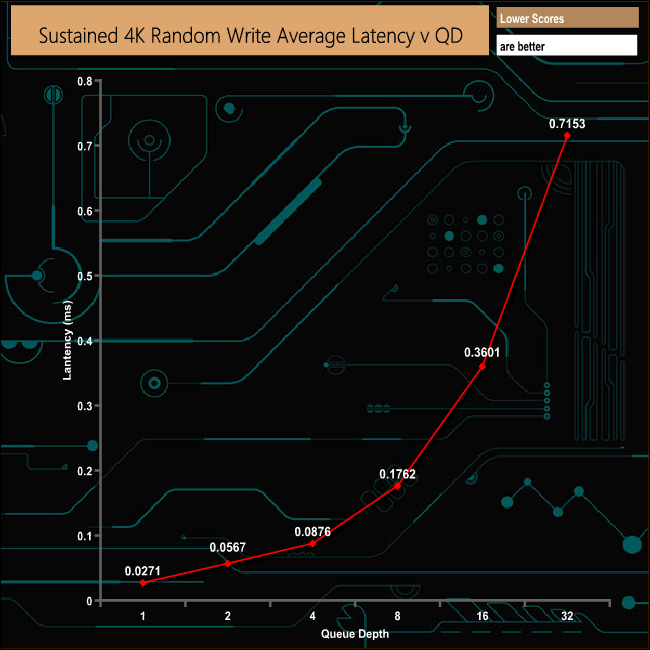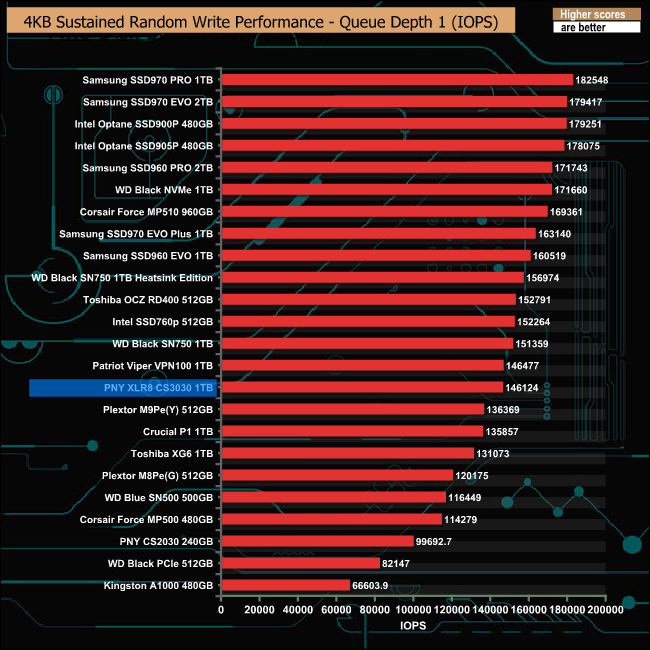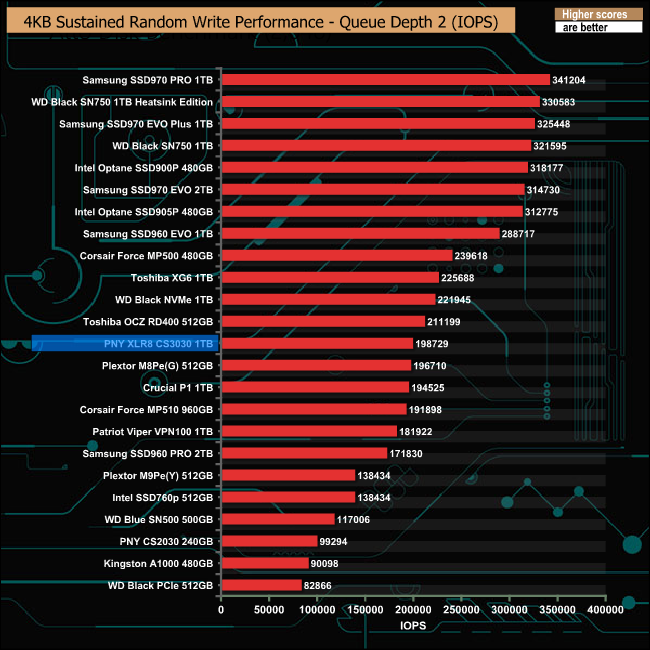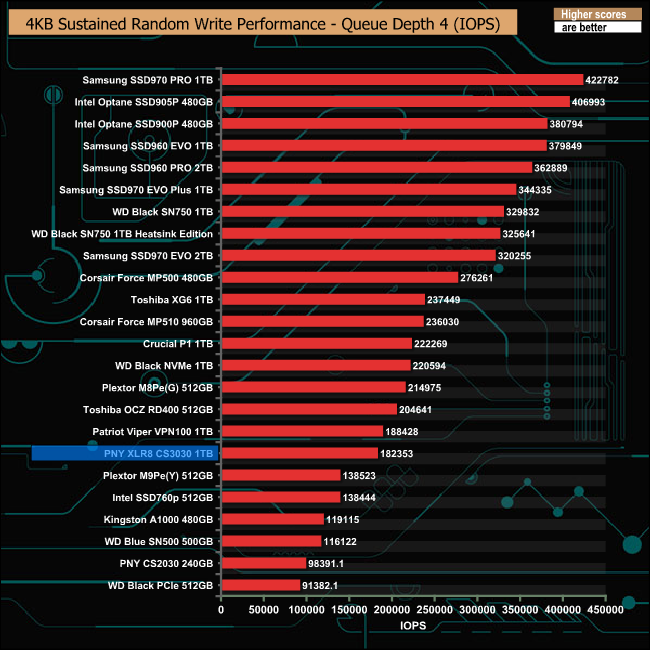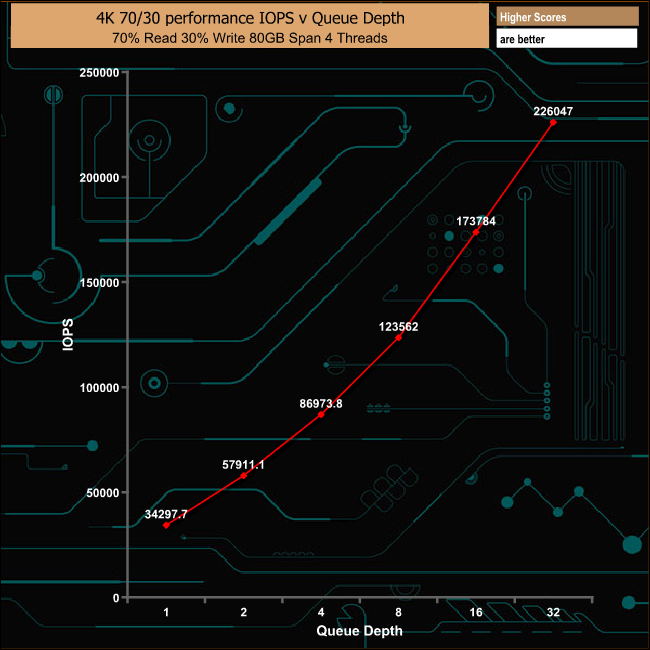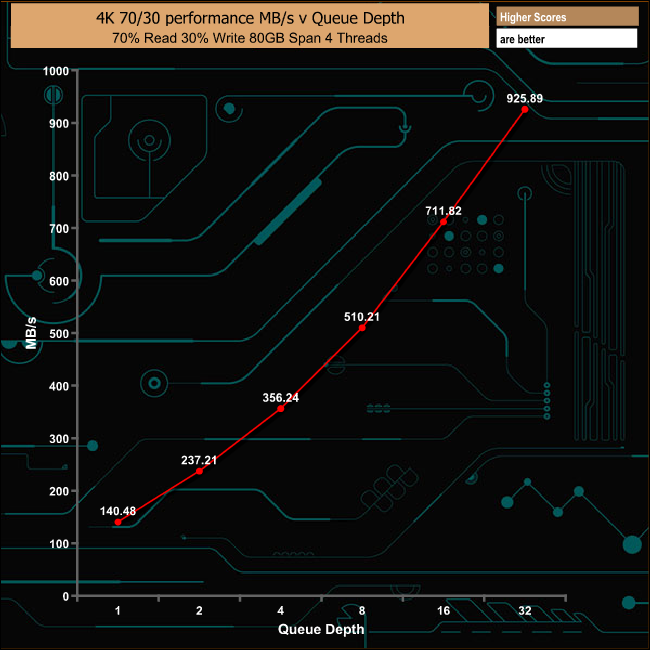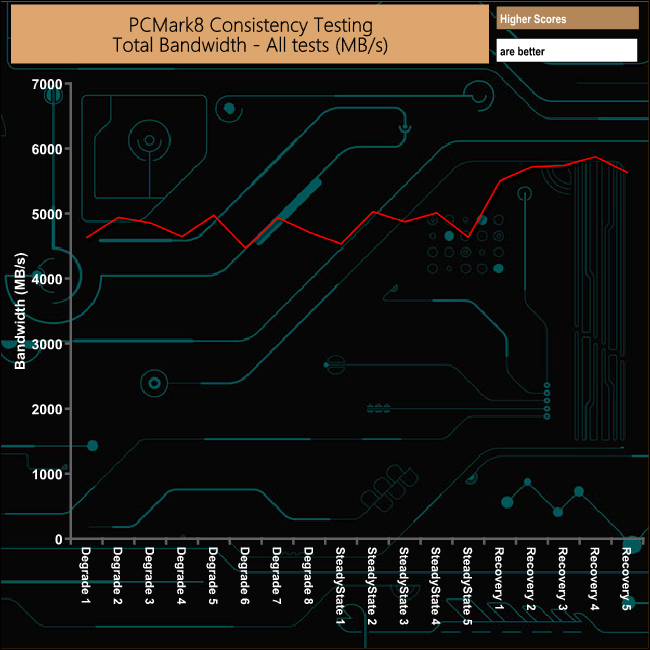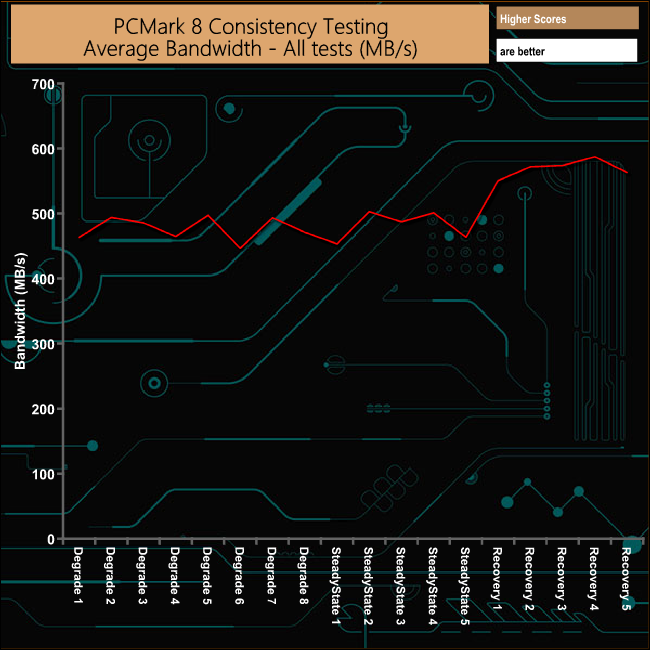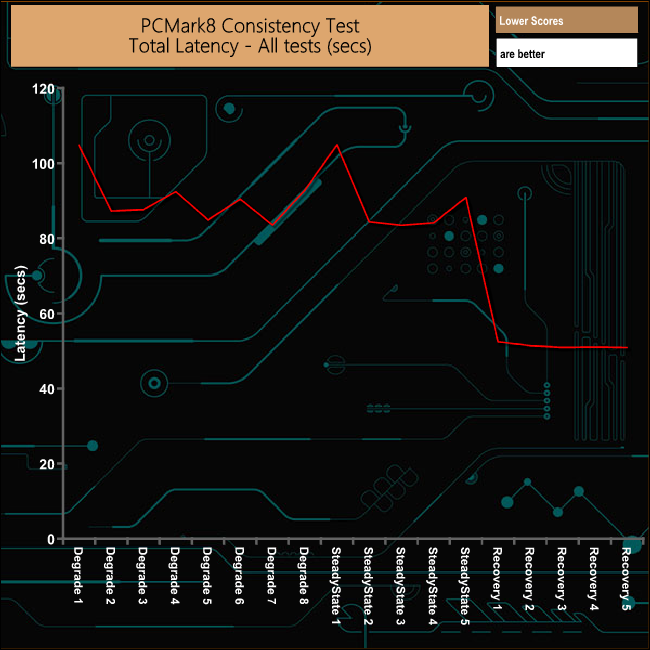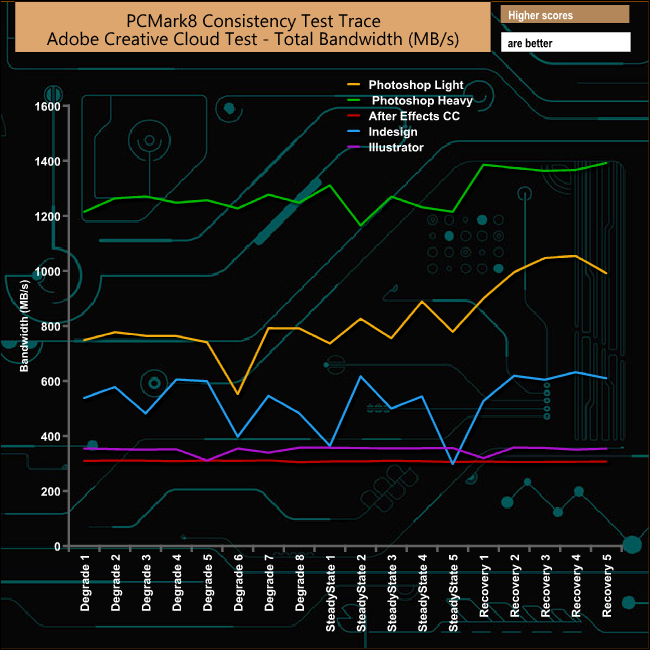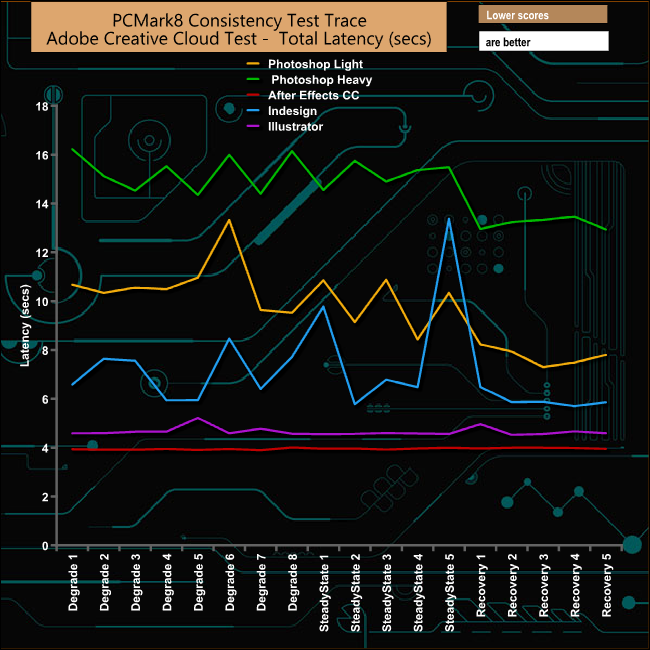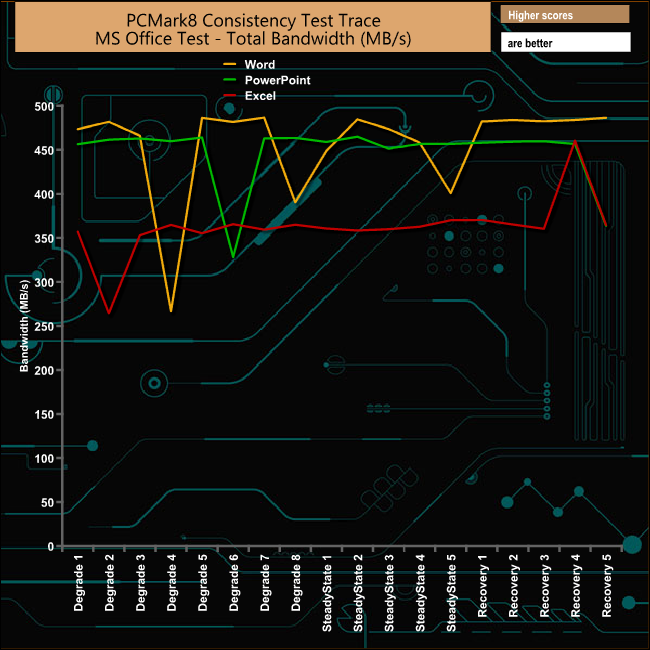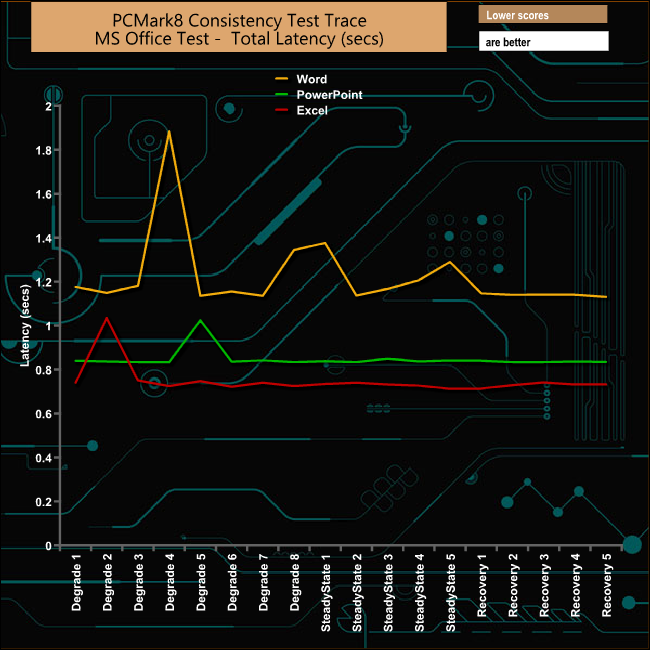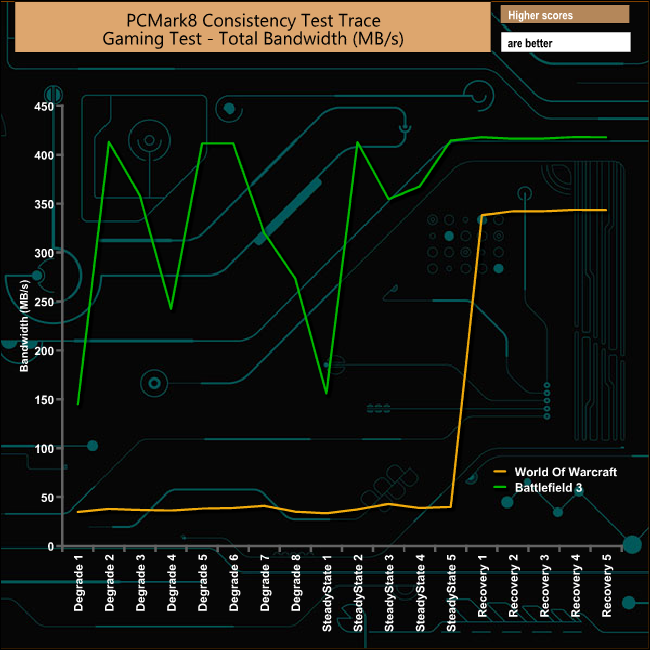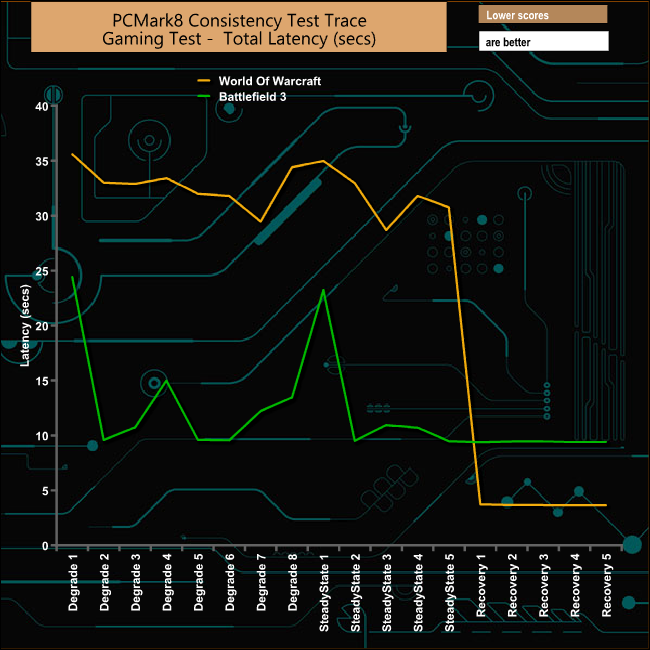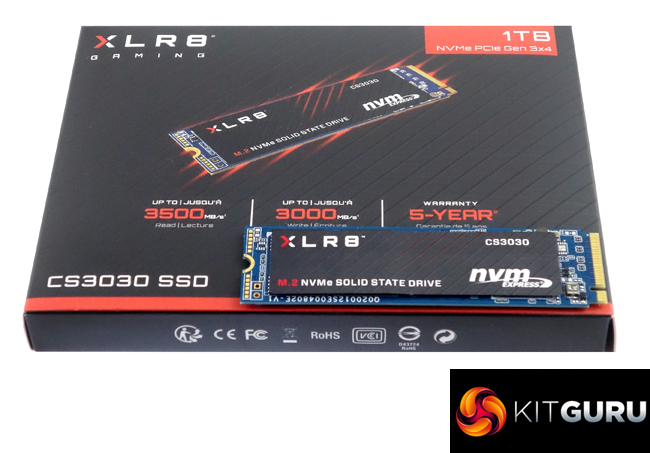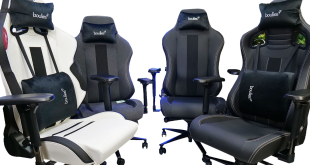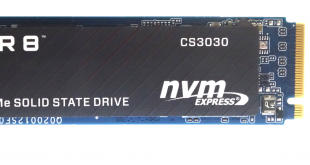
PNY's latest SSD addition to the ranks of their XLR8 gaming arm is the CS3030, an NVMe M.2 drive using a combination of a Phison controller and 3D TLC Flash NAND. Priced at around the £130 mark, is this worth buying?
The CS3030 is available in four capacities; 250GB, 500GB, 1TB (the drive we are reviewing here) and a flagship 2TB model. Sequential read speed is 3,500MB/s for all four drives while the write performance varies with size. The 250GB drive is rated at up to 1,050MB/s, the 500GB drive 2,000MB/s and the 1TB and 2TB drives at 3,000MB/s. Oddly PNY don't state any official random performance figures.
The drive uses the popular combination of a Phison PS5012-E12 8-channel controller and Toshiba 64-layer BiCS3 3D TLC NAND.
PNY rate the drives endurance as 380TBW for the 250GB drive, 800TBW for the 500GB, 1665TBW for the 1TB and 3115TBW for the 2GB model.
PNY back the drive with a 5-year warranty.
Physical Specifications:
Usable Capacities: 1TB
NAND Components: Toshiba 64-layer 3D TLC NAND
NAND Controller: Phison PS5012-E12
Cache: DDR4
Interface: PCIe x4 NVMe
Form Factor:M.2
Dimensions: 22 x 80 x 2mm
Drive Weight: 6.6g
Firmware Version: CS3003121
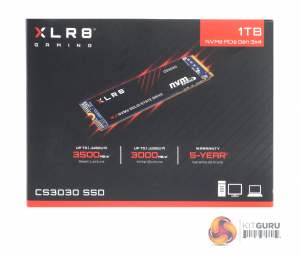
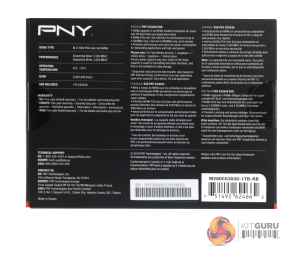
The CS3030 comes in a compact box with a image of the drive on the front along with the drives capacity on the top right hand corner. Under the drive image are the read and write Sequential speeds along with the drives warranty length. The rear of the box has a very small product info panel but most of the back is taking up by marketing points in English, French, Spanish and German.
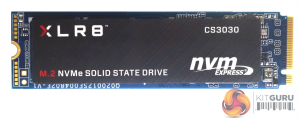
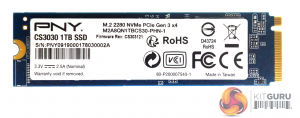
The CS3030 1TB drive is a double-sided PCB design with the components on both sides covered with product labels.
The front of the PCB holds the Phison PS5012-E12 controller, two Toshiba 64-layer BiCS NAND packages and a single DDR4 cache IC. The other side of the PCB is home to another pair of NAND packages and another DDR4 cache IC.
Phison’s PS5012-E12 is their second generation PCIe Gen3 x4 NVMe controller. The 8-channel controller is built on a TSMC 28nm process and has been designed to work with TLC and QLC NAND technologies with support for Phison’s SmartECC and the latest LDPC (Low-Density Parity Check) error correction as well as AES256, TCG OPAL and TCG Pyrite hardware encryption support. With 8 NAND channels and 32 NAND chip enable lines, the maximum amount of NAND the controller can support is 8TB.
For testing, the drives are all wiped and reset to factory settings by HDDerase V4. We try to use free or easily available programs and some real world testing so you can compare our findings against your own system.
This is a good way to measure potential upgrade benefits.
Main system:
Intel Core i7-7700K with 16GB of DDR4-3200 RAM, Sapphire R9 390 Nitro and an Asus Prime Z270-A motherboard.
Other drives:
Corsair Force MP500 480GB
Corsair Force MP510 960GB
Crucial P1 1TB
Intel Optane SSD900P 480GB
Intel Optane SSD905P 480GB
Intel SSD760p 512GB
Kingston A1000 480GB
Plextor M9Pe(Y) 512GB
Plextor M8PeG 512GB
Patriot Viper VPN100 1TB
PNY CS2030 240GB
Samsung SSD970 EVO 2TB
Samsung SSD970 PRO 1TB
Samsung SSD960 PRO 2TB
Samsung SSD960 EVO 1TB
Samsung SSD960 EVO Plus 1TB
Toshiba XG6 1TB
Toshiba OCZ RD400 512GB
Western Digital Black SN750 1TB
Western Digital Black SN750 1TB with Heatsink
Western Digital Black NVMe 1TB
Western Digital Black PCIe 512GB
Software:
Atto Disk Benchmark 3.05.
CrystalMark 6.0.0.
AS SSD 2.0.
IOMeter.
Futuremark PC Mark 8
All our results were achieved by running each test five times with every configuration this ensures that any glitches are removed from the results. Trim is confirmed as running by typing fsutil behavior query disabledeletenotify into the command line. A response of disabledeletenotify =0 confirms TRIM is active.
CrystalDiskMark is a useful benchmark to measure theoretical performance levels of hard drives and SSD’s. We are using v6.0.
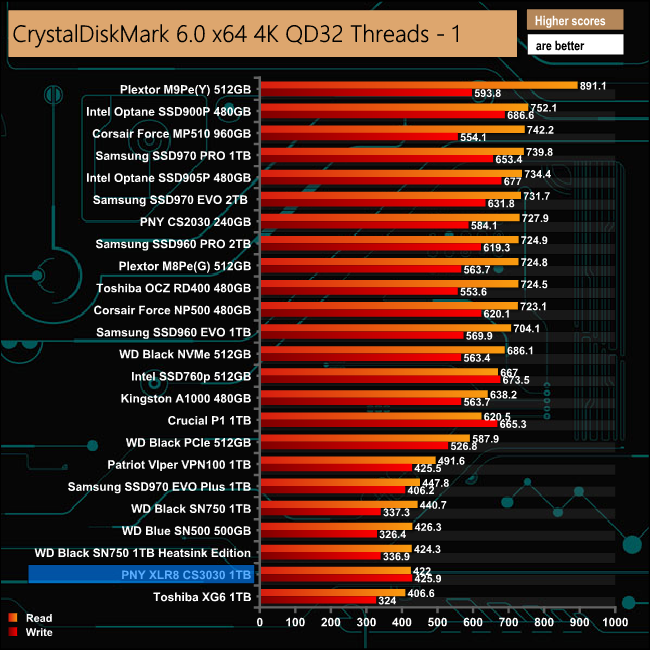
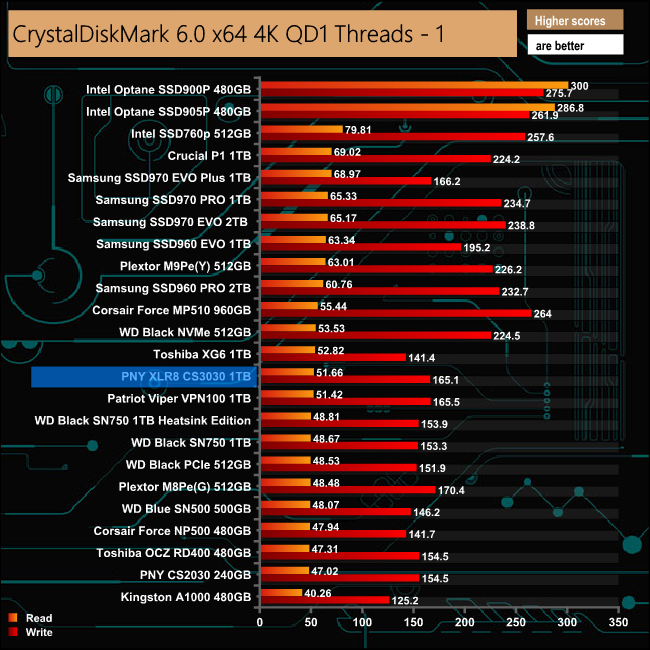
Looking at the two benchmark screens it seems the controller has a preference for highly compressible data when it comes to read performance.
The ATTO Disk Benchmark performance measurement tool is compatible with Microsoft Windows. Measure your storage systems performance with various transfer sizes and test lengths for reads and writes. Several options are available to customize your performance measurement including queue depth, overlapped I/O and even a comparison mode with the option to run continuously.
Use ATTO Disk Benchmark to test any manufacturers RAID controllers, storage controllers, host adapters, hard drives and SSD drives and notice that ATTO products will consistently provide the highest level of performance to your storage.
We are using version 3.5 for our NVMe disk tests.
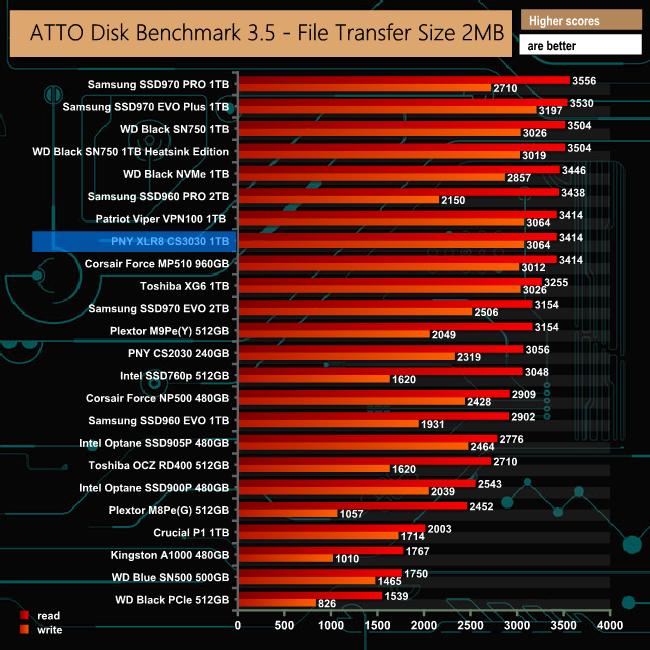
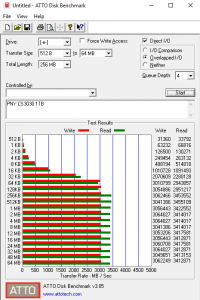
PNY quote Sequential performance for the 1TB CS3030 as up to 3,500MB/s for reads with writes at up to 3,000MB/s. We could confirm both of these figures with the ATTO benchmark with the review sample drive producing 3,414MB/s and 3,064MB/s figures for reads and writes respectively.
AS SSD is a great free tool designed just for benching Solid State Drives. It performs an array of sequential read and write tests, as well as random read and write tests with sequential access times over a portion of the drive. AS SSD includes a sub suite of benchmarks with various file pattern algorithms but this is difficult in trying to judge accurate performance figures.
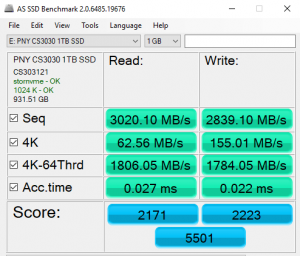
The 2171 read score in AS SSD puts the CS3030 into third place in our results chart, however the write score of 2223 isn't as strong as many of the drives around it.
IOMeter is another open source synthetic benchmarking tool which is able to simulate the various loads placed on hard drive and solid state drive technology. There are many ways to measure the IOPS performance of a Solid State Drive, so our results will sometimes differ from manufacturer’s quoted ratings. We do test all drives in exactly the same way, so the results are directly comparable.
We test 128KB Sequential read and write and random read and write 4k tests. The test setup’s for the tests are listed below. Each is run five times.
128KB Sequential Read / Write.
Transfer Request Size: 128KB Span: 8GB Thread(s): 1, Outstanding I/O: 1-32 Test Run: 20 minutes per test
4K Sustained Random Read / Write.
Transfer Request Size: 4KB Span: 80GB Thread(s): 4, Outstanding I/O: 1-32 Test Run: 20 minutes per test
4K Random 70/30 mix Read/Write.
Transfer Request Size: 4KB Span: 80GB Reads: 70% Writes: 30% Thread(s): 4 Outstanding I/O: 2 – 32 Test Run: 20 minutes
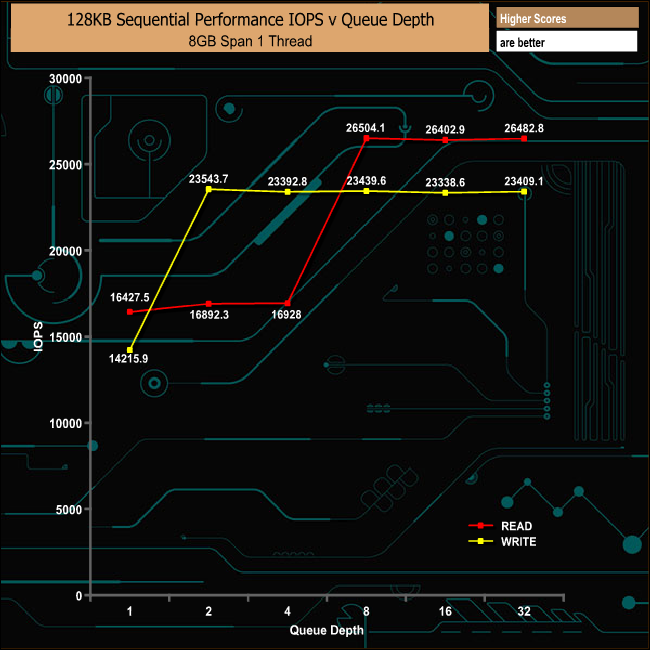
As with the ATTO benchmark we could confirm the official Sequential performance figures for the drive with our own 128KB Sequential tests. The drive peaked at 3,473.95MB/s for reads, just shy of the official 3,500MB/s read figure while the writes peaked at 3,085.92MB/s, a smidgen better than the official 3,000MB/s.
128KB Sequential Read v QD Performance
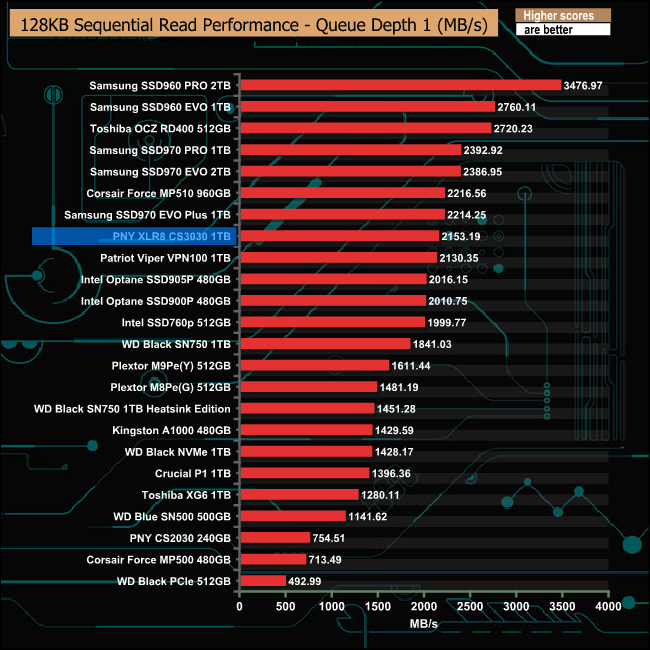
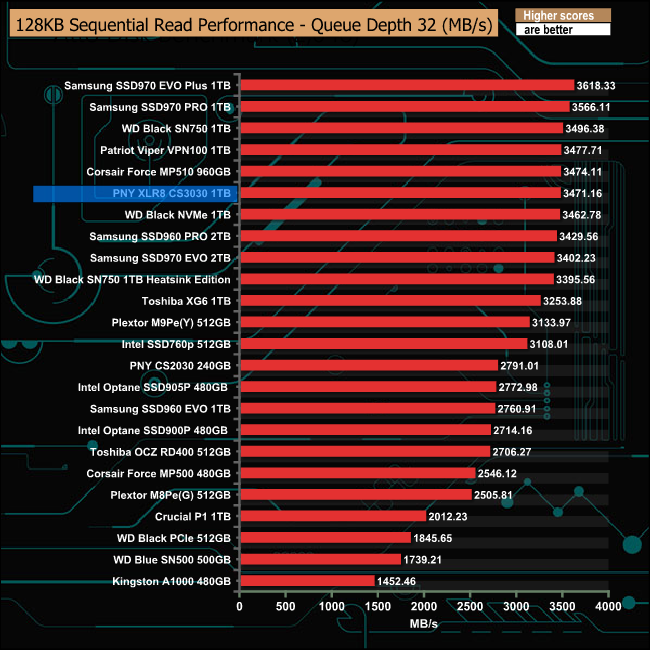
The CS3030 hold its performance as the queue depth deepens with the exception of QD4 where it drops down the chart, but at QD32 it's firmly in the top half of the results chart.
128KB Sequential Write v QD Performance
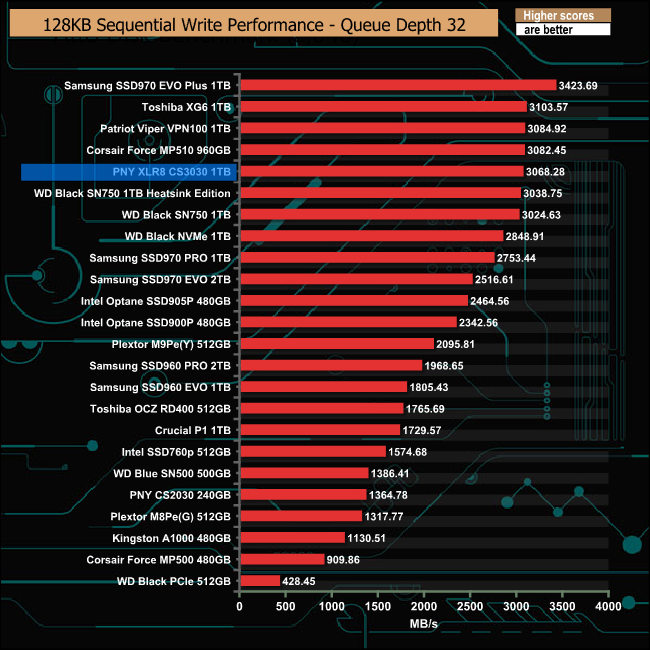
When it comes to Sequential write performance versus queue depth, the CS3030 remains pretty consistent across the queue depths we tested it at.
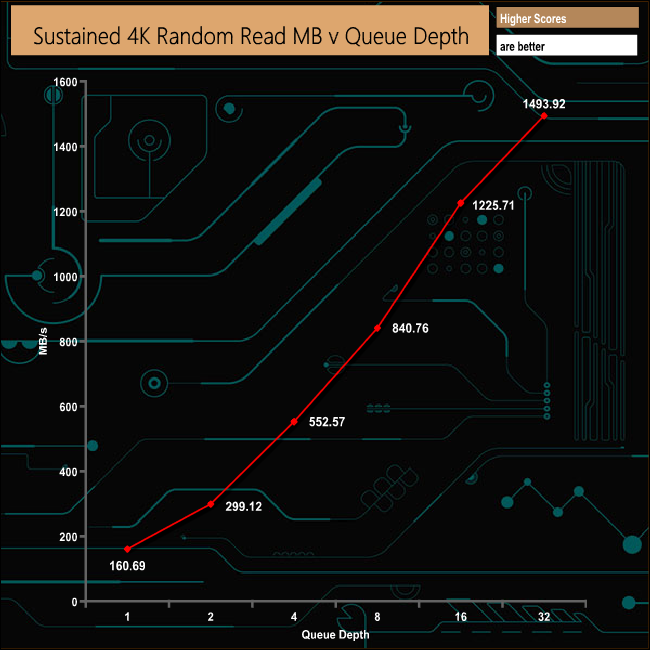
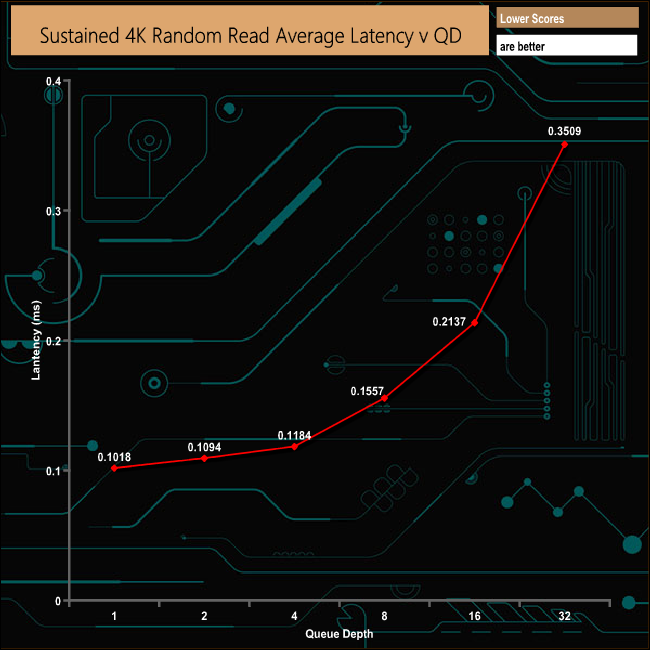
The 4K random read performance of the CS3030 climbs steadily through the queue depths we test at, finishing with an IOPS figure of 364,725 IOPS at a QD of 32.
4K Random Read v QD Performance
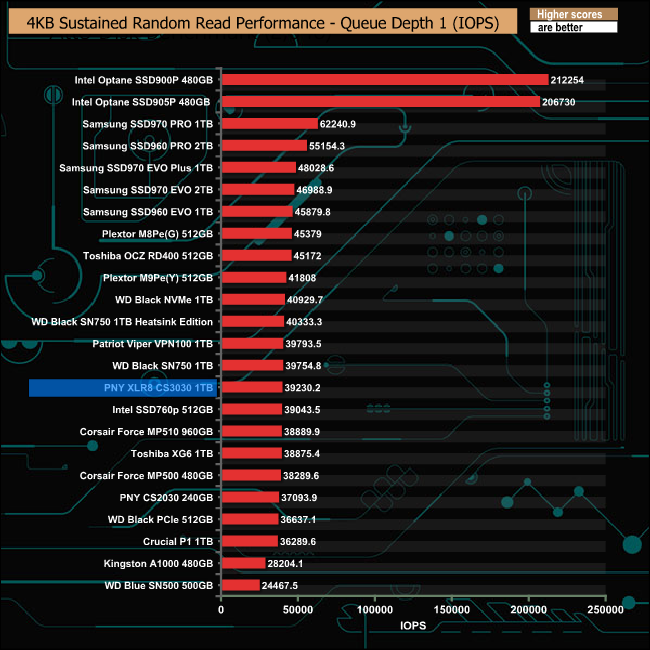
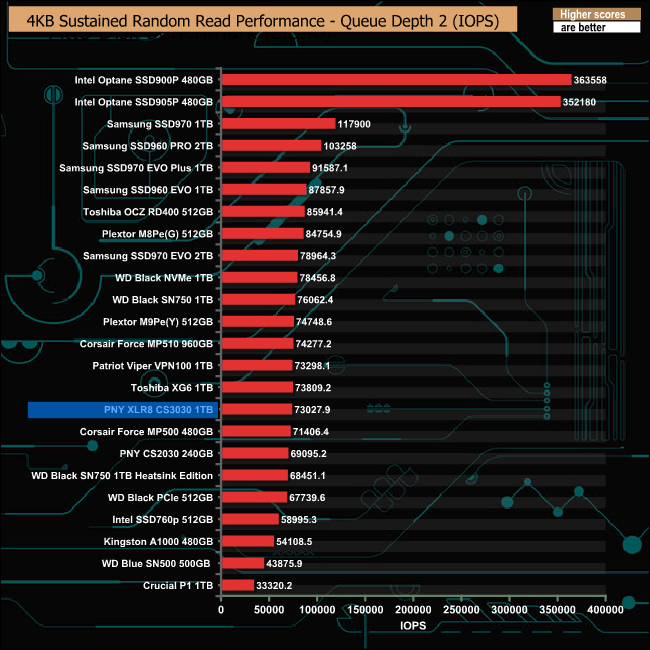
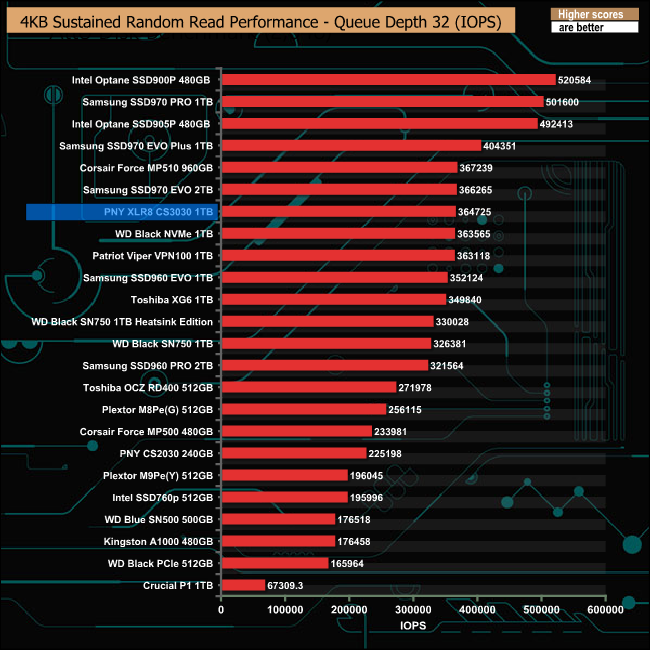
PNY don't quote any 4K random figures for the drive but the 4K random read performance gap between the CS3030 and the previous generation CS2030 widens as the queue depth deepens.
4K Random Write v QD Performance
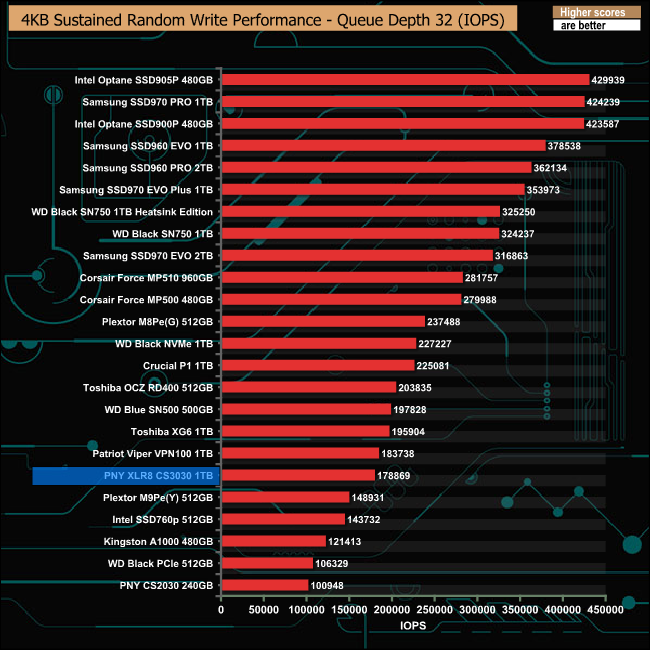
In our 4K random tests, the drive peaked at 198,729 IOPS at a queue depth of 2.
4K 70/30 Mixed Performance
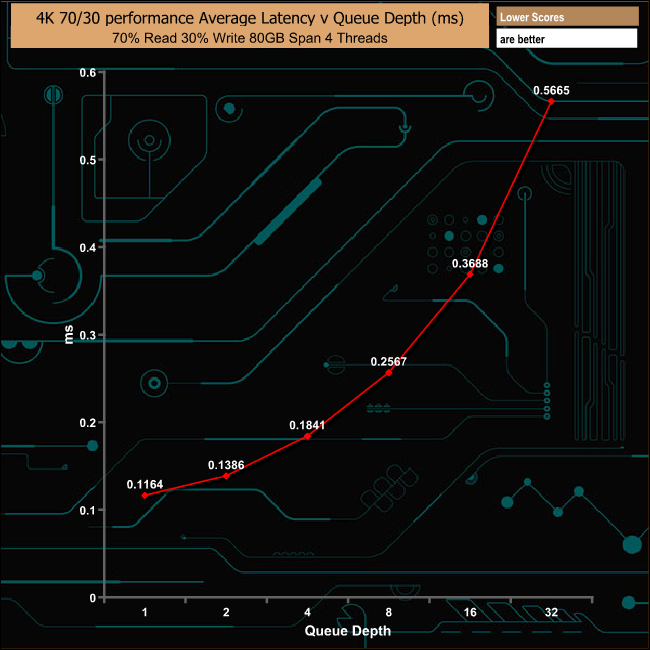
PNY's CS3030 handles the 4K mixed test very well, with the performance improving steadily as the queue depth deepens.
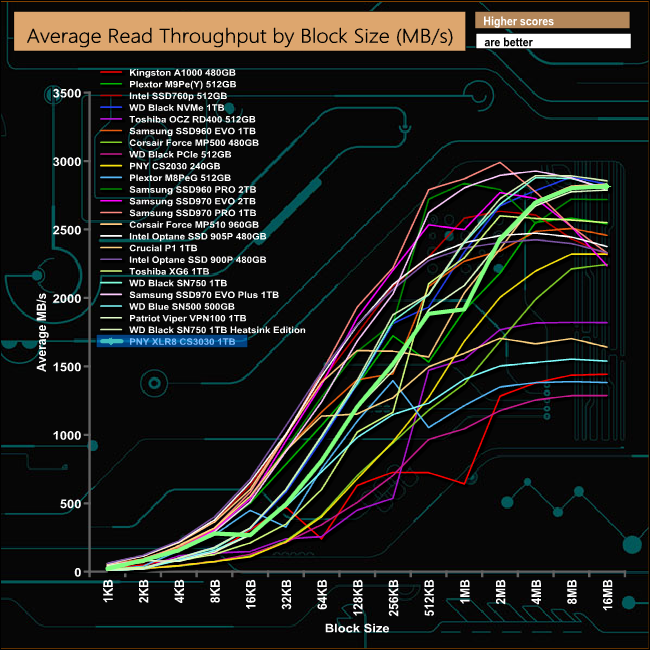
Peak read throughput came at the end of the test at 2,814.80MB/s.
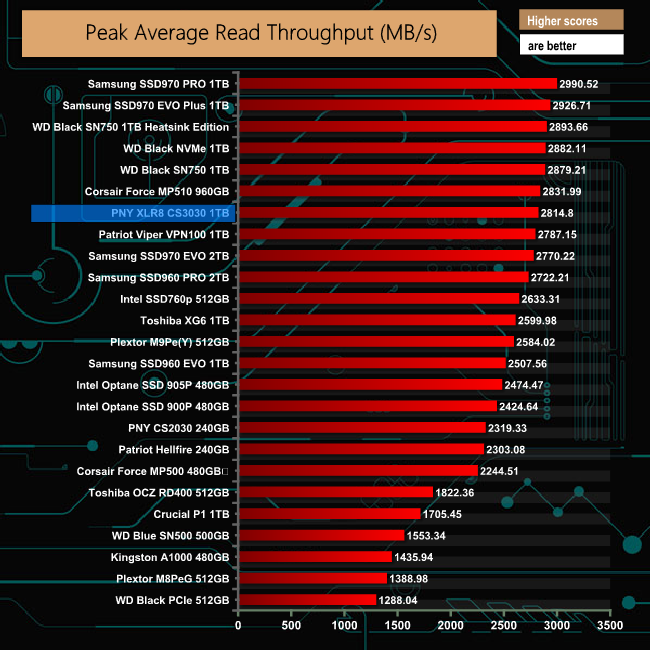
That peak read throughput figure of 2814.80MB/s puts the drive firmly in the Top10 fastest consumer drives we've looked at to-date.
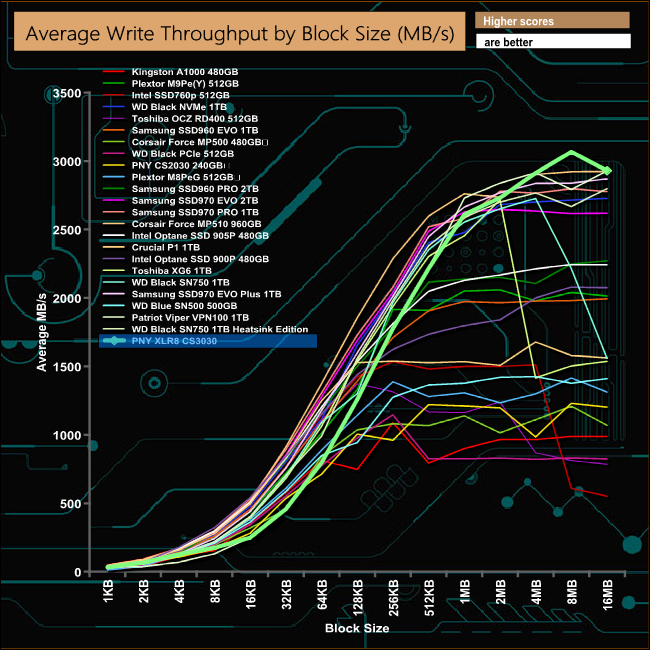
Peak write throughput occurred at the 8MB block mark with the drive producing 3066.88MB/s before dropping back slightly at the end of the test.
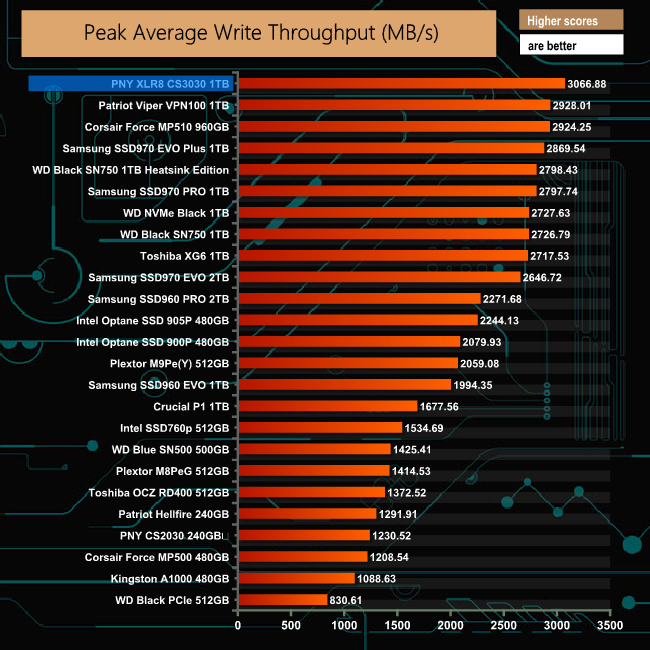
That peak write figure of 3066.88MB/s plants the drive firmly on top of our write throughput chart.
Futuremark’s PCMark 8 is a very good all round system benchmark but it’s Storage Consistency Test takes it to whole new level when testing SSD drives. It runs through four phases; Preconditioning, Degradation, Steady State, Recovery and finally Clean Up. During the Degradation, Steady State and Recovery phases it runs performance tests using the 10 software programs that form the backbone of PCMark 8; Adobe After Effects, Illustrator, InDesign, Photoshop Heavy and Photoshop Light, Microsoft Excel, PowerPoint, Word, Battlefield 3 and World of Warcraft. With some 18 phases of testing, this test can take many hours to run.
Preconditioning
The drive is written sequentially through up to the reported capacity with random data, write size of 256 × 512 = 131,072 bytes. This is done twice.
Degradation
Run writes of random size between 8 × 512 and 2048 × 512 bytes on random offsets for 10 minutes. It then runs a performance test. These two actions are then repeated 8 times and on each pass the duration of random writes is increased by 5 minutes.
Steady State
Run writes of random size between 8 × 512 and 2048 × 512 bytes on random offsets for final duration achieved in degradation phase. A performance test is then run. These actions are then re-run five times.
Recovery
The drive is idled for 5 minutes. Then a performance test is run. These actions are then repeated five times.
Clean Up
The drive is written through sequentially up to the reported capacity with zero data, write size of 256 × 512 = 131,072 bytes.
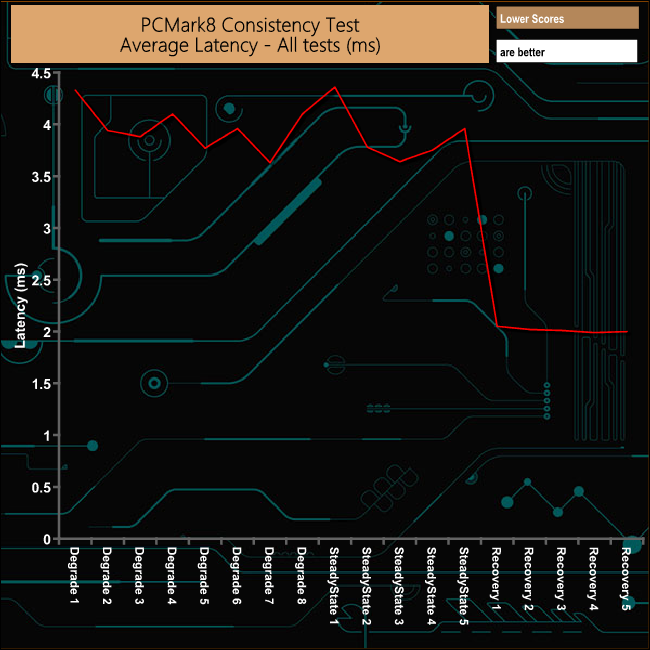
Overall the CS3030 handles the stresses of PCMark 8's Consistency test pretty well with no major drops in bandwidth. It recovers well, but the recovery isn't that consistent.
PCMark 8’s Consistency test provides a huge amount of performance data, so here we’ve looked a little closer at how the 1TB CS3030 performs in each of the benchmarks test suites.
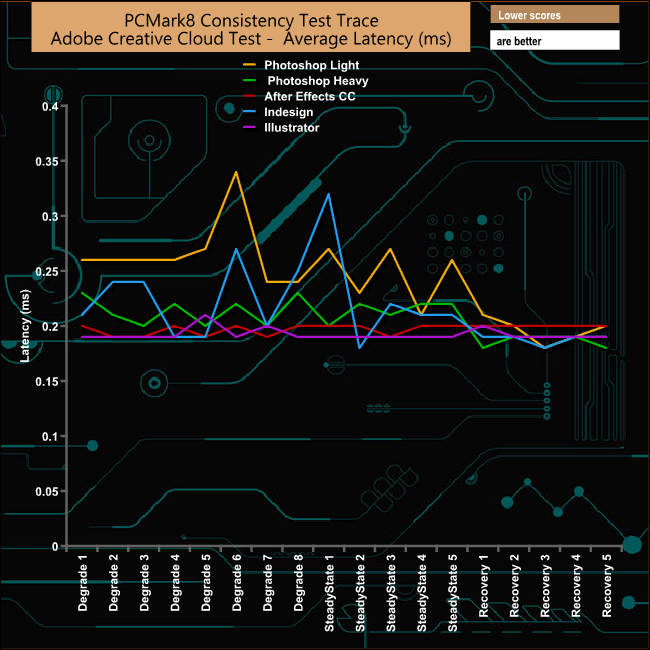
The drive produces some strong bandwidth figures during the Adobe CC tests particularly the PhotoShop Heavy trace. The overall recovery is pretty good too.
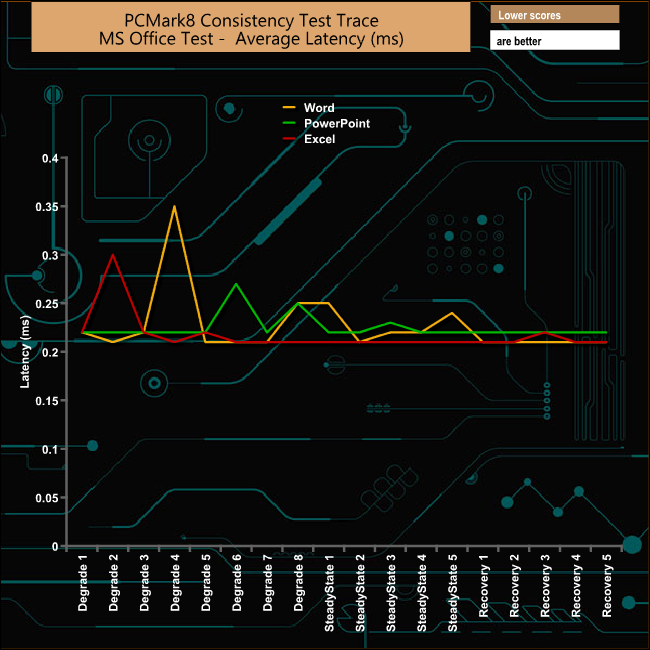
In the Microsoft Office part of the test, it's usually the Word test trace that causes drives most problems and the CS3030 is no different with some plunges in bandwidth at the fourth and eighth Degradation phases and again at the fifth SteadyState phase.
Casual Gaming
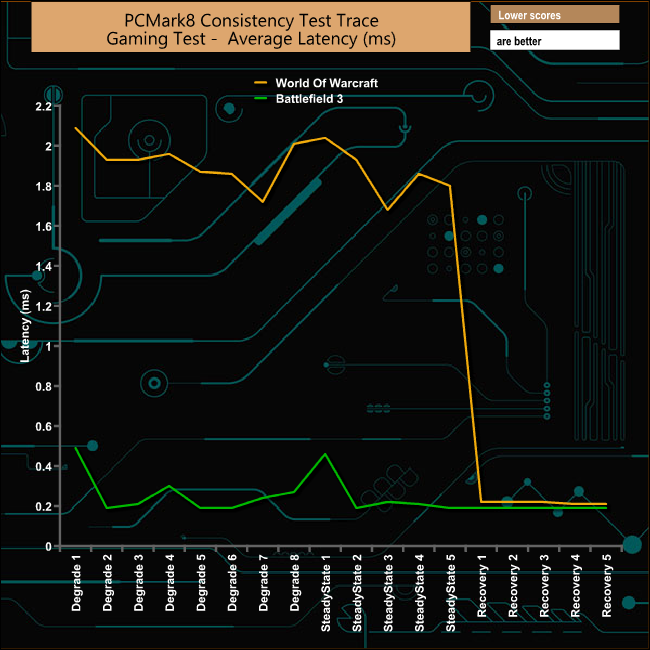
The CS3030 doesn't handle either of the casual gaming tests very well with very low bandwidth numbers for the World Of Warcraft test while the Battlefield 3 test is all over the place. The recovery from the World of Warcraft test is however, stunning.
Just like the Consistency test, PCMark 8’s Standard Storage test also saves a large amount of performance data. The default test runs through the test suite of 10 applications three times. Here we show the total bandwidth performance for each of the individual test suites for the third and final benchmark run.
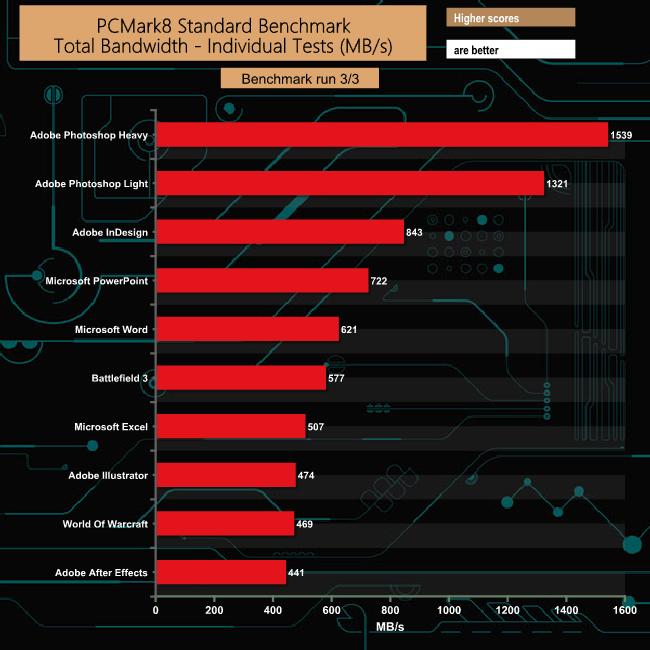
PNY's CS3030 drive delivers strong performance throughout the tests in the PCMark 8's Standard Storage benchmark with both the Adobe Photoshop tests doing well.
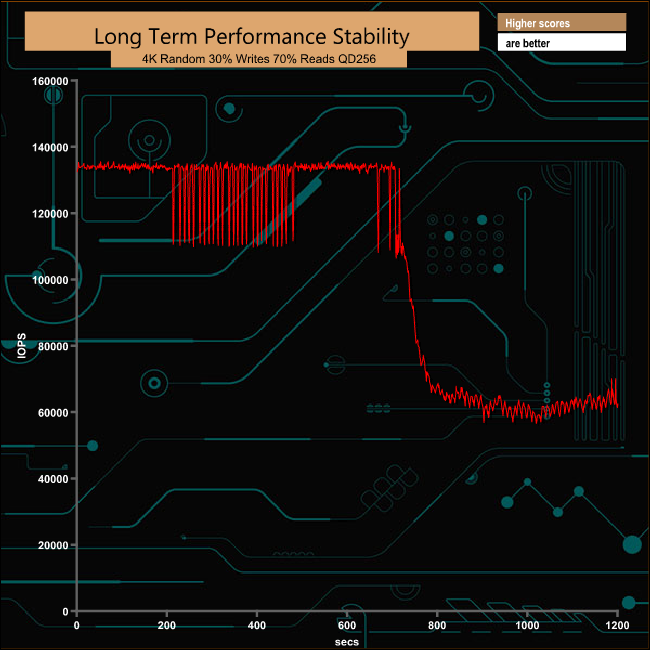
For the long term performance stability test, we set the drive up to run a 20-minute 4K random test with a 30% write, 70% read split, at a Queue Depth of 256 over the entire disk. The 1TB PNY CS3030 averaged 105,314 IOPS for the test with a performance stability of 77.87% which is very good for this class of drive.
To test real life performance of a drive we use a mix of folder/file types and by using the FastCopy utility (which gives a time as well as MB/s result) we record the performance of drive reading from & writing to a 256GB Samsung SSD850 PRO.
100GB data file.
60GB iso image.
60GB Steam folder – 29,521 files.
50GB File folder – 28,523 files.
21GB 8K Movie demos.
12GB Movie folder – 24 files (mix of Blu-ray and 4K files).
11GB 4K Raw Movie Clips (8 MP4V files).
10GB Photo folder – 621 files (mix of png, raw and jpeg images).
10GB Audio folder – 1,483 files (mix of mp3 and .flac files).
5GB (1.5bn pixel) photo.
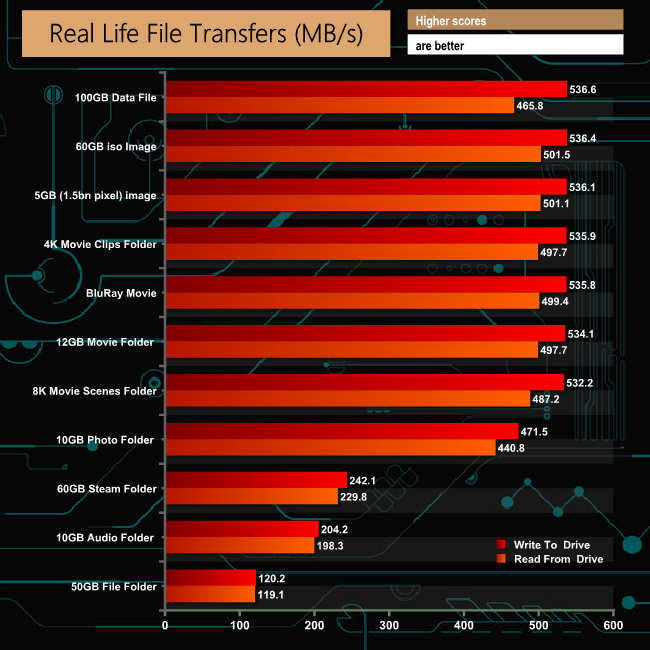
The CS3030 handled our real life transfer tests without any problems. It's much happier dealing with large file sizes than smaller bity files.
To get a measure of how much faster PCIe NVMe drives are than standard SATA SSD's we use the same files but transfer to and from a 512GB Toshiba OCZ RD400.
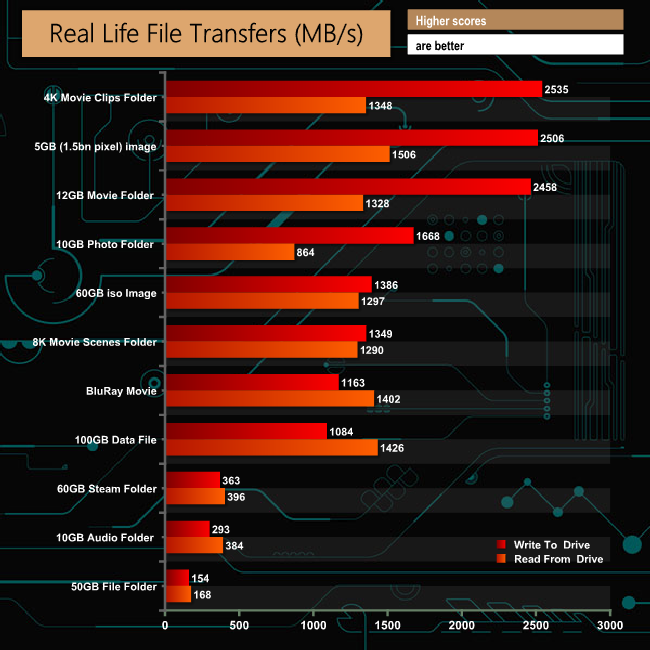
Taking the SATA drive out of the loop, the drive shows some excellent performance when dealing with the large files in the 4K movie and 12GB Movie folders and the 5GB photo.
The last PNY drive we looked at was the CS2030, the company's first NVMe drive way back in 2017. The CS2030 used Toshiba 15mn MLC NAND in combination with a Phison PS5007-E7. The new CS3030 sees updates in both NAND and controller with its Toshiba 64-layer BiCS NAND and Phison PS5012-E12 controller combination.
The new drive is available in four capacities, an entry level 250GB model, 500GB and 1TB drives with a 2TB flagship drive topping of the range.
The only official performance figures to be found on the spec sheet for the drive are Sequential read/writes, which is a bit odd. But the 1TB drive is rated as up to 3,500MB/s for reads and up to 3,000MB/s for writes. Using the ATTO benchmark we couldn't quite get to the maximum read figure, the review drive producing a figure of 3,414MB/s. Tested writes, on the other hand, were a wee bit better at 3,064MB/s.
It was the same when the drive was tested with our 128KB Sequential tests, with a read peak result of 3,473.95MB/s with peak writes coming in at 3,085.92MB/s.
PNY don't state any 4K random performance figures for the drive but in our tests the best read IOPS figure we got from the drive was 364,725 IOPS at a QD of 32. The best write figure was 198,729 IOPS at a queue depth of 2.
We found the 1TB CS3030 on Amazon for £133.37 HERE
Pros
- Overall Performance.
- 5-year warranty.
Cons
- 4K performance a little disappointing in some of our tests.
KitGuru says: PNY's new CS3030 performs well and is priced to give it a chance in a highly competitive market segment.
 KitGuru KitGuru.net – Tech News | Hardware News | Hardware Reviews | IOS | Mobile | Gaming | Graphics Cards
KitGuru KitGuru.net – Tech News | Hardware News | Hardware Reviews | IOS | Mobile | Gaming | Graphics Cards


